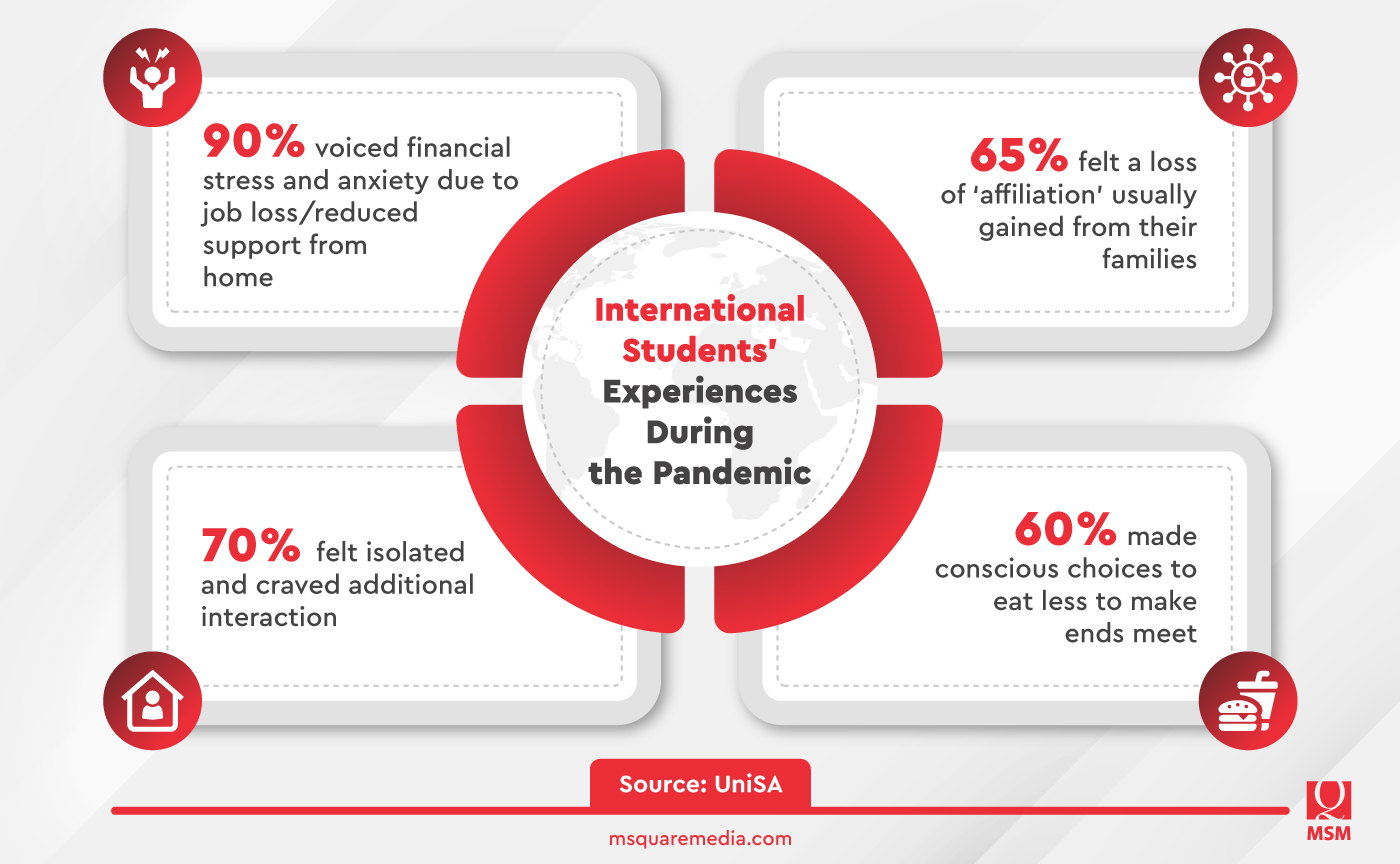Key Takeaways:
- Australia’s economy benefited by more than $37.6 billion from international education.
- Around 90% of the students surveyed in the report encountered financial stress and anxiety due to job loss or diminished family support.
- In response to the concerns of international students, the University of South Australia has established the International Student Wellbeing Network (ISWN) team, whose mission is to provide international students with the resources they need to access, navigate, and comprehend Australian education, culture, and society.
Education abroad has historically been one of Australia’s most valuable exports, contributing substantially to the economy and supporting thousands of jobs. According to recent data from the Australian Bureau of Statistics, international student arrivals in February 2023 totaled 142,580, an increase of 93,270 students compared to the same month the year prior.
International education is the largest export of services in South Australia and sustains approximately 11,800 jobs. International education contributed over $37.6 billion to the national economy before the COVID-19 pandemic. These numbers demonstrate the significance of the international education industry to the Australian economy.
While the number of international students returning to Australia is increasing “at a healthy rate,” as described by Universities Australia, experts from the University of South Australia have called for broader community support to prioritize international students’ health, well-being, and social connection.
Key findings of the UniSA study
New research from the University of South Australia highlights the need for universities to provide international students in Australia with more comprehensive support. Dr. Hannah Soong, an education sociologist, surveyed onshore international students at multiple educational institutions to gather insights into their experiences during the pandemic that are especially pertinent today.

The study’s results are remarkable. According to the report, 90% of the students surveyed experienced financial anxiety and stress due to job loss or limited family support. Because many international students rely on part-time employment to finance their studies and living expenses, the pandemic’s economic impact has been devastating for them. The study also found that 70% of the students felt isolated and yearned for more interaction. Social isolation is a significant issue for international students, particularly during the pandemic when restrictions on movement and gatherings have been implemented.
In addition, 65% of the students surveyed felt a loss of the familial affiliation they had previously possessed. The pandemic has accentuated feelings of isolation from one’s support network, which can be exacerbated by studying abroad and leaving one’s home. To make ends meet, 60% of the students consciously decided to eat less. The high cost of living in Australia makes it difficult for many international students to find ways of making enough to survive, and the pandemic has only served to worsen this problem.
Implementing 360-degree support for international students
The study by Dr. Hannah Soong emphasizes the importance of colleges and universities placing a high priority on the welfare of international students, who frequently struggle to adjust to life in a foreign land and culture. This is especially true now that the pandemic has made many students’ financial, social, and emotional problems worse.
To address these problems, the University of South Australia has established the International Student Wellbeing Network (ISWN) team, which is made up of community partners and leaders in education. The group is committed to giving international students the tools to access, navigate, and understand Australian society, culture, and education.
Promoting improved cross-cultural connections and opportunities for domestic-international interactions and understanding is one of the key objectives of the ISWN. This will make it easier for international students to integrate into their new communities and surroundings. To give students more support, the team also wants to forge better ties with community networks outside of the university.
According to UniSA Business Development Manager Dino Rossi, the “university-community partnership” model can be highly effective in putting the welfare of onshore international students first. By connecting students with community networks, they can gain access to valuable counsel and support that can assist them in overcoming obstacles. This strategy can ultimately enhance the experience of international students and strengthen connections with the greater community.
Supporting initiatives
To provide international students in Australia with 360-degree support, universities should adopt a more diverse and comprehensive approach that prioritizes their well-being. Universities can offer financial assistance through scholarships or emergency funds, provide access to mental health services and counseling, offer language and academic support, and create opportunities for international students, in addition to initiatives like the International Student Wellbeing Network (ISWN).
Community organizations can also play a role in supporting international students by providing opportunities for language practice, cultural exchange programs, and mentoring. Additionally, government agencies can assist with visa and immigration issues and provide employment and housing resources.
By working together, universities, community organizations, and government agencies can create a comprehensive support system that addresses the diverse needs of international students in Australia. This 360-degree approach not only benefits the students but also strengthens the international education industry and its contributions to the Australian economy. (SUNEETHA QURESHI)

SUNEETHA QURESHI
MSM President
Suneetha has worked for 15 years in the international education sector and 25 years overall for her work for other industries. As president of MSM, she fortifies its business development outreach globally, particularly in the face of MSM’s foray into edtech-based recruitment via MSM Unify. She preserves the premium, value-adding services provided to each MSM partner institute, including dedicated teams on the ground, agent management, lead generation and inquiry management, application prescreening, and student and parent support through pioneering pre-departure briefing sessions.
She has an impeccable track record of successfully launching the representative offices in Asia and Africa of many North American and European higher education institutions. Her key strengths include hiring, training, and developing teams as evidenced by the successful results of the dedicated in-country college and university client teams.
Suneetha also has taken the lead in developing several initiatives at MSM, including building robust standard operating procedures, the Rise ‘n Shine team engagement platform, and the organization’s data analytics and audit segments.
Sources:
- 2023. Humanising international education requires 360-degree support. University of South Australia. Retrieved from https://www.newswise.com/articles/humanising-international-education-requires-360-degree-support
- 2023. Overseas Arrivals and Departures, Australia. Australian Bureau of Statistics. Retrieved from https://www.abs.gov.au/statistics/industry/tourism-and-transport/overseas-arrivals-and-departures-australia/feb-2023
- 2023. Australia: 111% Increase in International Students in January. Erudera. Retrieved from https://erudera.com/news/australia-111-increase-in-international-students-in-january/

